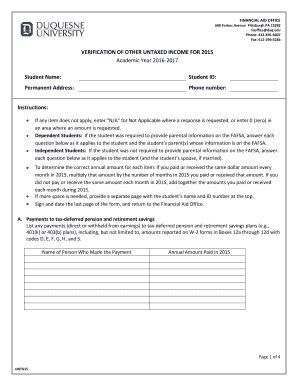Introduction
Pursuing higher education is a significant investment, and understanding your financial aid options is crucial. Duquesne University (DUQ) offers a range of financial assistance programs to help students cover the costs of tuition, fees, and living expenses. This comprehensive guide will provide you with a clear understanding of DUQ financial aid, including eligibility criteria, application processes, and types of aid available.

Types of DUQ Financial Aid
DUQ offers a variety of financial aid options to meet the diverse needs of its students. These include:
Grants: Free money awarded to students based on financial need, academic merit, or other factors.
Scholarships: Merit-based awards that recognize academic achievement, leadership, or community service.
Loans: Money borrowed from the federal government or other lenders that must be repaid with interest.
Work-Study: Federal program that allows students to work on campus in exchange for financial assistance.
Military Benefits: Benefits available to veterans and active-duty military members and their families.
How to Apply for DUQ Financial Aid
To be considered for DUQ financial aid, you must complete the Free Application for Federal Student Aid (FAFSA). You can apply online at FAFSA.gov. The FAFSA deadline is June 30th; however, it is recommended to apply as early as possible.
Step-by-Step Application Process:
- Gather required documents: Social Security number, driver’s license or passport, tax returns, and other financial information.
- Create an FSA ID: This is your personal identification number used to access the FAFSA website.
- Complete the FAFSA: Provide information about your income, assets, and household size.
- Submit the FAFSA: Electronically sign and submit your application.
Eligibility Criteria
Eligibility for DUQ financial aid is based on several factors, including:
Financial Need: Students must demonstrate financial need through the FAFSA process.
Academic Merit: Scholarships and grants may require a certain GPA or standardized test scores.
Other Factors: Some aid programs may consider factors such as residency, major, or other special circumstances.
Awarding Process
Once you have submitted your FAFSA and been deemed eligible, DUQ will send you a financial aid award letter. This letter will outline the types and amounts of aid you have been awarded. The award letter will also include instructions on how to accept or decline your awards.
Effective Strategies for Maximizing Financial Aid
Apply Early: Submitting your FAFSA early increases your chances of receiving aid from all sources.
Explore All Options: Research different types of financial aid and don’t limit yourself to only grants and scholarships.
Negotiate with DUQ: If you receive a financial aid award that does not meet your needs, contact DUQ’s Financial Aid Office to discuss options for increasing your aid.
Consider Outside Scholarships: Search for scholarships offered by private organizations, corporations, and foundations.
Maximize Work-Study: Apply for work-study to earn additional money while reducing your student loan debt.
Explore Military Benefits: If you or your family members are eligible for military benefits, take advantage of them to reduce education costs.
Loan Repayment Options
If you borrow federal student loans to fund your education, you will need to repay them after graduation. There are several loan repayment options available:
Standard Repayment: Fixed monthly payments over a period of 10 years.
Extended Repayment: Lower monthly payments over a period of 25 years.
Graduated Repayment: Payments start low and gradually increase over 10 years.
Income-Driven Repayment: Monthly payments based on a percentage of your income.
FAQs
1. What is the FAFSA deadline?
June 30th.
2. What is the difference between a grant and a scholarship?
Grants are based on financial need, while scholarships are based on merit.
3. How do I accept or decline my financial aid award?
Follow the instructions on your financial aid award letter.
4. What do I do if I have questions about my financial aid?
Contact the DUQ Financial Aid Office.
5. Can I use financial aid to pay for living expenses?
Yes, some financial aid programs can be used to cover living expenses, such as housing and food.
6. What happens if I receive more financial aid than I need?
You can return the excess funds to the financial aid office.
Conclusion
Navigating the world of financial aid can be complex, but understanding your options can help you maximize your funding and reduce the cost of your education. By following the steps outlined in this guide, you can increase your chances of securing financial assistance from Duquesne University and pursuing your academic goals. Remember to apply early, explore all options, and negotiate with DUQ to get the most out of your financial aid package.
